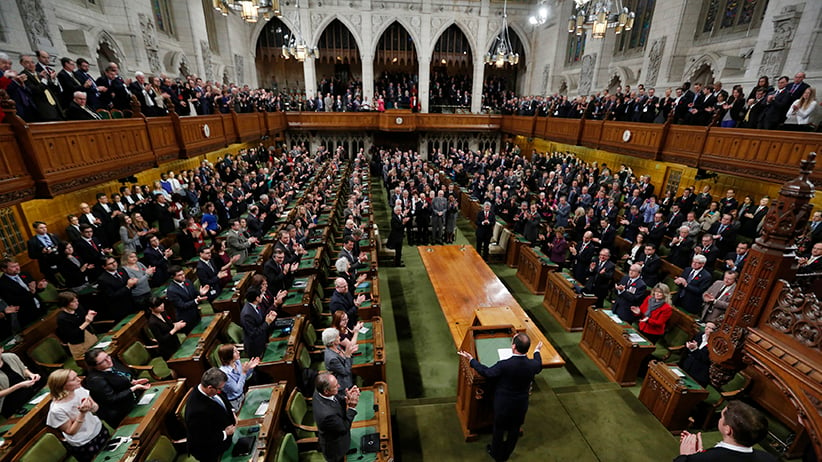A reboot proposal for Canada’s Parliament
A new report from the Public Policy Forum points to a better way to run Canada’s legislatures
French President Francois Hollande (C) prepares to address a joint session of Parliament in the House of Commons in Ottawa November 3, 2014. REUTERS/Chris Wattie (CANADA – Tags: POLITICS) – RTR4CNRV
Share

Jim Dinning says it would be a major challenge to find 10 private members in any provincial or federal Parliament who could put their hands on their hearts and say, “Everything is running exactly as I hoped it would on the day I was elected.”
“There are too many marching orders,” the former Alberta finance minister says. “[There are] too many prescriptive directions on what you say, where you say it, when you say it, how you say it, and that has eroded the role of a parliamentarian.”
This isn’t just an issue in Ottawa, Dinning stresses, because there are 13 legislatures in provinces and territories across the country where members have given up authority—be it consciously or unconsciously—while increasingly more power over the legislative branch has trickled up into the offices of premiers or the PMO.
The good news, according to a paper released on Wednesday by the Public Policy Forum (of which Dinning was the panel chair), is that Canada’s parliaments are not beyond repair. The report, entitled “Time for a reboot,” offers nine recommendations in the pursuit of restoring trust in the country’s public institutions. The panel also included former Quebec premier Jean Charest.
One major step, recommended by the Public Policy Forum, would be to strengthen parliamentary committees. This could start by having the entire House of Commons elect committee chairs via a secret ballot. It’s not an unfamiliar idea; this is how they elect the Speaker of the House. Not only would a secret ballot incentivize MPs to reach out for support outside their own party, it would solidify that a committee chair’s mandate came from the House, not necessarily thanks to the backing of a party leader. To stave off the threat of losing a committee position by not toeing party lines, the report explains these positions could instead be set to last a full term, with the ability to set their own meeting schedules, even if the House is not in session.
The second major step outlined in the report would be to restore the “relevance and importance” of cabinet, which could get off to a good start by simply letting ministers appoint their own chief of staff. As it stood recently in Ottawa, a minister’s political staff was appointed by—and reported to—the PMO.
But with 338 MPs coming to Ottawa, and various numbers of MPPs depending on the province, Dinning admits things could get messy as power is decentralized. However, “if they’re honest and don’t promise to be right all the time,” he says, “I think there’s a high tolerance to wade through that messiness.”
After all, the public’s tolerance for the status quo is fading. Only 40 per cent of Canadians reported trusting that what their MP does is right, according to a recent report from Samara Canada, a non-partisan advocacy group for civic engagement. Political parties as a whole didn’t fare much better, with only 42 per cent of Canadians placing some trust in them.
And yet, attempts to score political points are often what Canadians see in parliaments, especially in an age of 24-hour news cycles. If any mini-scandal erupts, “citizens are engaged far more than ever before and expect an instantaneous response,” Dinning says. “The time for more thoughtful, deliberative policy work gets trumped by what we call ‘short-termism.’ ”
When it comes to public accountability, the Public Policy Forum points to a report from the integrity commissioner of Ontario that states: “There is a need for balance and sober second thought to ensure that the actions of minister’s staff are consistent with fulfilling the government’s mandate and they are not focused predominantly on how an issue will affect the political party’s standing.” As such, the Public Policy Forum recommends parliaments introduce a code of conduct for political staff—which exists already in the U.K., Australia and B.C.—and establish formal oversight mechanisms of political staff.
None of the recommendations are revolutionary, nor are they as easy to implement as it might seem. “If it was easy it might have been done by now,” Dinning says. But it’s likely he’d be able to find more than 10 private members in Parliament who would put their hand on their heart and say this is what we should aspire to become.